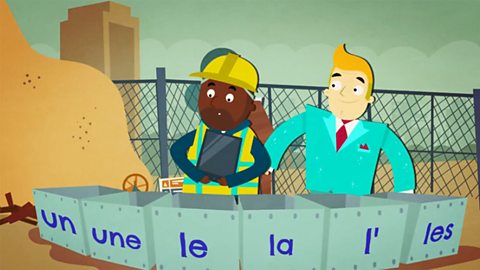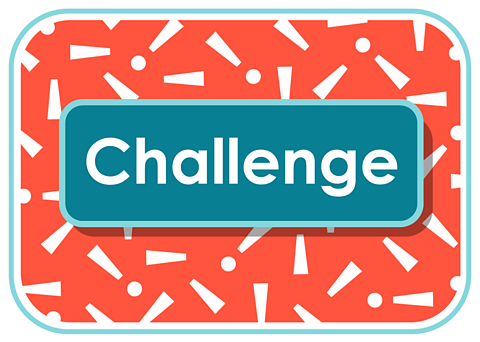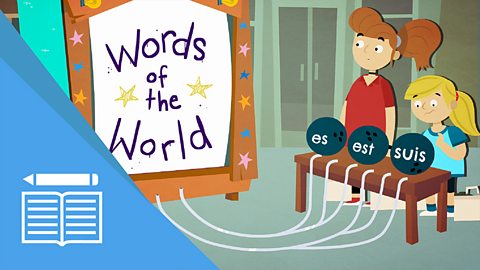Nouns are words for people or things.
In French all nouns are either masculine or feminine and this has an impact on the words you use with them.
Saying 'a' or 'the' in French
'A' and 'the' (known as 'articles') are English words that we put before a noun to talk about it. For example ‘a pen’ or ‘the pen’.
In French we do the same thing. However, French articles can either be singular or plural and masculine or feminine depending on the noun.
Find out more below:
Learn about indefinite and definite articles in French with Burt Bessington
Burt: Hello and welcome to Words of the World!
I'm your host, Burt Bessington!
And here with a chance of winning some fantastic prizes is our lucky contestant!
Builder: Ur, hang on a minute, Steve. Did you say prizes?
Burt: Everything you remember you will take home with you today!
Voice-over: Un bateau
Burt: In English, we say 'a boat', but in French nouns are masculine or feminine. 'Boat' is a masculine noun, so here we use un for 'a'.
Voice-over: Une télévision
Burt: For feminine nouns, we use une for 'a'.
Voice-over: Le miroir
Burt: For definite articles, we use the masculine le to say 'the'.
Voice-over: La tablette
Burt: Or the feminine la for 'the’.
Voice-over: L'ordinateur
Burt: With masculine and feminine nouns that begin with a vowel, the le or la is shortened. L' goes before the word.
Voice-over: Les tournesols
Burt: Masculine and feminine plural is les meaning 'the'.
Okay, time's up. Let's see how many you've remembered.
Builder: Oh, la tablette, l'ordinateur, les tournesols, un bateau, le miroir, une télévision
Burt: And that's it! Congratulations these prizes are all yours!
Builder: Oh wow! Oh brilliant! Er yeah, Steve, just put it down there. Ohh.
'Un’ and ‘une’ (Saying ‘a’ or ‘an’ in French)
We use these words (also known as indefinite articles) before the noun when we are talking about something that's not specific.
It's the same as using a, an or some in English, for example "a sandwich".
In French, nouns can be masculine or feminine, so if we want to say a, we use either Sorry, something went wrongCheck your connection, refresh the page and try again. for masculine nouns or Sorry, something went wrongCheck your connection, refresh the page and try again. for feminine nouns.
Here are some examples:
| Masculine nouns | English | Feminine nouns | English |
|---|---|---|---|
| Sorry, something went wrongCheck your connection, refresh the page and try again. | a boat | Sorry, something went wrongCheck your connection, refresh the page and try again. | a television |
| Sorry, something went wrongCheck your connection, refresh the page and try again. | a computer | Sorry, something went wrongCheck your connection, refresh the page and try again. | a tablet computer |
‘Le’, ‘la’, ‘les’

We use these words (also known as definite articles) when we are talking about a specific noun.
It is the same as saying the in English, for example "the cat".
To say the in French, there are a few different words depending on the noun:
- Sorry, something went wrongCheck your connection, refresh the page and try again. is for masculine nouns
- Sorry, something went wrongCheck your connection, refresh the page and try again. is for feminine nouns
- Sorry, something went wrongCheck your connection, refresh the page and try again. is for masculine or feminine nouns that begin with a vowel or some words that begin with a h
- Sorry, something went wrongCheck your connection, refresh the page and try again. is for plural nouns - when there is more than one item
Here are some examples:
| Noun type | French | English |
|---|---|---|
| Masculine | Sorry, something went wrongCheck your connection, refresh the page and try again. | the boat |
| Feminine | Sorry, something went wrongCheck your connection, refresh the page and try again. | the tablet computer |
| Before a vowel or h | Sorry, something went wrongCheck your connection, refresh the page and try again. | the computer |
| Plural | Sorry, something went wrongCheck your connection, refresh the page and try again. | the sunflowers |


Did you know...?
…that English used to have masculine and feminine nouns?
In fact, Old English had three different genders: masculine, feminine and neuter. This disappeared from the English language as it evolved and changed over time.
However, we do still think of some things as being masculine or feminine. For example, boats are often thought of as feminine (she).
Scots Gaelic, Irish Gaelic and Welsh have masculine and feminine nouns, as do most other European and Indian languages such as French, Spanish, German, Polish, and Hindi.
How do you form plurals in French?

In English, if there is more than one thing, we normally add s to the end of a regular noun to make it plural. For example:
- one car
- two cars
In French, we also add s to most nouns to make them plural.
- Sorry, something went wrongCheck your connection, refresh the page and try again. – the tablet computer
- Sorry, something went wrongCheck your connection, refresh the page and try again. – the tablet computers
If a noun ends in -s, -x or -z, it stays the same when there is more than one.
- Sorry, something went wrongCheck your connection, refresh the page and try again. – the nose
- Sorry, something went wrongCheck your connection, refresh the page and try again. – the noses
If a word ends in –al, you normally take off the l and add ux to make it plural:
- Sorry, something went wrongCheck your connection, refresh the page and try again. – the animal
- Sorry, something went wrongCheck your connection, refresh the page and try again. – the animals
Words ending in -eau and -eu have an x at the end when they become plural:
| Singular | English | Plural | English |
|---|---|---|---|
| Sorry, something went wrongCheck your connection, refresh the page and try again. | the boat | Sorry, something went wrongCheck your connection, refresh the page and try again. | the boats |
| Sorry, something went wrongCheck your connection, refresh the page and try again. | the game | Sorry, something went wrongCheck your connection, refresh the page and try again. | the games |

Key French words
| French | English |
|---|---|
| Sorry, something went wrongCheck your connection, refresh the page and try again. | the animal |
| Sorry, something went wrongCheck your connection, refresh the page and try again. | a boat |
| Sorry, something went wrongCheck your connection, refresh the page and try again. | the game |
| Sorry, something went wrongCheck your connection, refresh the page and try again. | the mirror |
| Sorry, something went wrongCheck your connection, refresh the page and try again. | the nose |
| Sorry, something went wrongCheck your connection, refresh the page and try again. | the computer |
| Sorry, something went wrongCheck your connection, refresh the page and try again. | the tablet computer |
| Sorry, something went wrongCheck your connection, refresh the page and try again. | a television |
| Sorry, something went wrongCheck your connection, refresh the page and try again. | the sunflowers |
Test your knowledge

Which languages are you spoken in your class or school?
Do any of these have masculine and feminine nouns?
You can listen to examples of old English online.
Try listening to an example and discuss what this tells us about languages and how they change over time.
More on Language skills: Knowledge about language
Find out more by working through a topic
- count2 of 4

- count3 of 4

- count4 of 4
